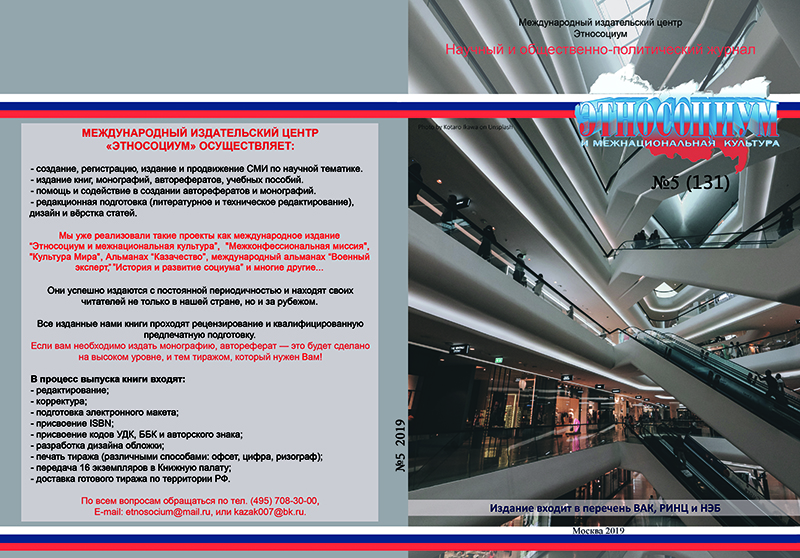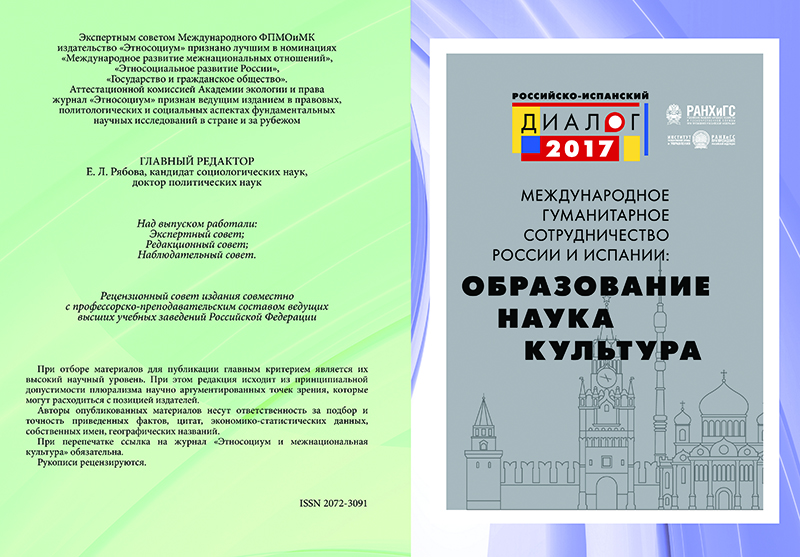

Content
|
COUNCIL OF INTERNATIONAL RELATIONSHIP
|
|
|
Maklashova E.G. State Ethnonational Policy of Russia: Construction of the Multinational People of the Russian Federation
|
9
|
|
Komleva V.V., Zhizhych Andriyana Substitutional migration policy: the German experience
|
18
|
|
Belugina N.B. Features of information warfare between Russia and the West at the present stage
|
41
|
|
ACTUAL PROBLEMS OF MODERN SOCIETY:
POLITICS, ECONOMICS, LAW
|
|
|
Bormotova T.M., Kuzminski A.E., Taranco A.N. Strategic analysis in the development of management decisions in a conflict of interest (experience of sociological and psychological research)
|
49
|
|
REGIONAL STUDY:
POLITICS, ECONOMICS, LAW
|
|
|
Napso M.D. Some aspects of the problem of nationalism
|
71
|
|
INTERNATIONAL RELATIONSHIPS:
POLITICS, ECONOMICS, LAW
|
|
|
Murashko S.F., Dolgenko A.N., Bogoslovskaya V.R., Rudakova S.V. English as a tool of «soft power»
|
79
|
|
Tian Qingsong Relationship between the people’s republic of China and the Korean republic in structure the indo-pacific strategy of D. Trump
|
85
|
|
Biryukov S.V., Ryabova E.L. Retro-conservatism of Jair Bolsonaro, the fate of the BRICS and the prospects for a multipolar world
|
89
|
|
Tkachev M.M. Russia-US relations after the election of 45th president of the USA Donald Trump
|
100
|
|
Shamarov P.V. Theory of peacekeeping: the problem and content
|
112
|
|
NEWS
|
|
|
Zorin V.U. At the international forum in Brussels "Russia and Europe in the context of global migration"
|
123
|
|
Abstracts
|
129
|
|
Authors
|
132
|
|
Requirements to materials submitted to the international publishing house "Etnosocium"
|
143
|
The cultural diversity of the population of Russia has the legal recognition and consolidation within the framework of the concept “multinational people of the Russian Federation”. The article raises the question of the meaning of the term "multinational people of the Russian Federation" in the Strategy of the state national policy of the Russian Federation for the period up to 2025. The features of the adjustment of this content are considered. The methodology of the study is based on the political-legal analysis of the old and new versions of the Strategy of the state national policy of the Russian Federation for the period up to 2025, and the draft of this document of 2018. The results of the expert survey of representatives of the authorities of nine subjects of the Far Eastern Federal District are given, which indicate that the multinational people of Russia are perceived by them as highly differentiated.
Keywords: strategy, state national policy, Russia, period, 2025, multinational, people, Russian Federation, nation, state, politics.
Replacing migration is considered by the authors as one of the ways to solve the socio-economic problems of countries with an aging population and a shortage of labor resources. Based on the German experience, the author analyzes the contradictions of the policy of replacement migration, its positive and negative sides. The article presents a large amount of empirical material, author's conclusions and recommendations regarding replacement migration.
Keywords: substitute migration, international migration, migration policy, migration processes, Germany.
The article is devoted to the problems of the modern information warfare and the peculiarities of information and psychological operations against Russia. A new round of information warfare facilitated the creation of a number of international projects aimed at the formation of a unified information and analytical system of the Western world, primarily the United States and the European Union. Mass media remains the main channel for information and communication operations. The author analyzes the media discourse of a number of Western magazines and identifies the main directions for creating a negative communicative context in relation to the Russian Federation.
Keywords: information warfare, information operation, propaganda, hybrid warfare.
The article deals with the problem of strategic decision-making in the presence of a conflict of values, when the interests of the subjects of management are affected. As an example, we take the situation with the use of public opinion as a criterion for assessing the activities of the police, as well as the situation in connection with Russia's accession to the Bologna process in education and the introduction of a competence approach as an important part of these processes. The growth of antagonism in the system of values, polarization of interests of social groups and, first of all, elites are considered as essential factors that necessitate the adjustment of social policy (Grand strategy) affecting these areas. It is argued that the strategic analysis of these areas and the development of management decisions suggest the presence in society of broad value agreement as its necessary prerequisite. The article is based on the conducted sociological research of employees of regional administrative units of the Ministry of internal Affairs and psychological research among University teachers in the form of a survey.
Keywords: strategic analysis, management decision-making, conflict of interest, public opinion, evaluation criterion of the police, Bologna process, competence approach, modernization of education.
The article is devoted to the analysis of linguistic and extralinguistic conditions that ensure the status of English as a global language in modern intercultural communication. Being the main tool of Internet communication, global English influences the development of modern Russian at the level of not only vocabulary, but also grammar. The intensification of analyticism in the grammar system of the modern Russian language is the result of the influence of English as an instrument of “soft power” in modern global communication.
Keywords: language globalization, Russian language in global communication, the policy of “soft power”.
In article features of relationship between People's Republic of China and the Korean peninsula in the context of geopolitics which is carried out by the president of the United States of America Donald Trump in the Pacific Rim are considered.
Research objectives: the analysis of the developed relationship between China and Korea and the impacts of impact on them third-party geopolitical forces.
Research problems: to consider features of relationship between China and Korea, influence on these relations of the United States of America and to estimate the prospects of further development of a geopoliticheky situation in the Pacific Rim.
Research hypothesis: Relationship between the countries of Southeast Asia developed throughout the millennia and was caused by existence of several large regional states which temporary weakening in the 19-20th centuries, led to expansion to the region of the colonial powers of Europe which are actually forced out subsequently by the United States of America. Change of an economic situation in Southeast Asia in the last 50 years, at simultaneous weakening of the USA and Europe is led to radical shifts in the Pacific Rim.
Research methods: analysis, synthesis and scientific abstraction.
The achieved results: the most probable scenarios of further geopolitical development of the Pacific Rim are considered.
Keywords: China, Korea, the USA the Pacific Rim, the Pacific Rim, geopolitics, the Strategy of "rebalancing" of forces to the Pacific Rim, Return of the USA to the Pacific Rim to Barack Obama's times, the Indo-Pacific strategy during Donald Trump.
The article analyzes the turn in the domestic and foreign policy of one of the BRICs founders countries – Brazil – after the victory in the presidential elections of 2019, the right-conservative candidate Jair Bolzonaro, whose political style the authors define as «retro-conservatism». The authors analyze the political and socio-economic platform of Bolzonaro and the changes he plans to make in the domestic policy of the country – with a projection on the fate of the BRICS and the prospects of a multipolar world. The researchers come to the conclusion that the right-conservative course in the foreign policy of modern world and regional powers means the triumph of the ideology of «national egoism» in their foreign policy – which objectively complicates the coordinated formation of the structure of a multipolar world and increases the chaos in the system of international relations. Therefore, only a return to a strategy of meaningful and coordinated multipolarity can be a constructive way out of the current crisis situation in world politics.
Keywords: Brazil, Bolsonaro, "right" turn, retro-conservatism, neo-realism, BRICS, multipolar world.
The following article is devoted to revision of relations between Russia and the USA nowadays. This research looks into the key problems between the two countries, finds out their respective positions on this or that matter and helps to comprehend which issues currently Russia and the USA are facing. The resolution of this controversies may facilitate the improvement of political climate as far as bilateral ties are concerned.
Keywords: Russia, USA, contemporary period, relations, problems, difficulties.
The article examines the problem of international peacekeeping in terms of the development of its practice and theory, formed as a result of the symbiosis of international law-making, the accumulated scientific theoretical-conceptual framework and practical activities of the subjects of peacemaking.
The necessity of formulating the theory of peacekeeping is substantiated and its author’s definition is proposed; formulated definitions of the aggressive transatlantic peacekeeping of the West and the pragmatic peacekeeping policy of Russia; modern approaches of the most important actors to the practice of peacemaking are identified and the inconsistency of their official positions and scientific views is investigated.
The paradigm of the implementation of modern peacemaking and the phenomenon of the lack of a semantic concept of “peacekeeping activity” in the NATO terminological glossary are revealed; The objective state need for the organization and implementation on a pragmatic basis of Russian peacekeeping from the standpoint of an element of the system for ensuring its national security is argued.
Keywords: theory of peacekeeping, international peacekeeping, peacemaking, peacekeeping operation, national security, national interests, national security system.